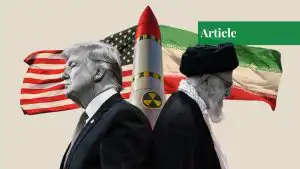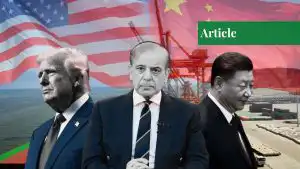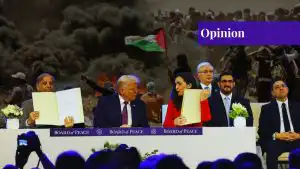The Strategic Mutual Defense Agreement between Saudi Arabia and Pakistan was extended in Riyadh on September 17, 2025. It states that an attack on one nation would be considered an attack on both. By putting their mutual defense duty, the action formalizes their long-standing relationship. The fact that Pakistan’s defense minister has stated unequivocally that Saudi Arabia will “be made available” nuclear capacity under the agreement is especially noteworthy.
Thousands of these military, commercial, and religious ties have historically existed between Saudi Arabia and Pakistan. Pakistan is heavily dependent on the Kingdom’s oil and has educated military personnel who have served in Saudi Arabia. The Kingdom has also provided financial support to Pakistan during times of crisis.
Once again, there is a significant religious connection: Saudi Arabia is home to the two holiest cities in Islam, and millions of pilgrims from Pakistan visit each year. This connection extends beyond simple strategic considerations. Historically, the two states have worked closely together on defense, which has included financial support, training, and intelligence sharing.
Strategic Benefits
Converged deterrence formalized: a joint defense response to an attack. The deal raises the level of strategic trust between Islamabad and Riyadh. Also, Saudi Arabia has a history of financial rescues, oil-on-deferred payment agreements, infrastructure investments in Pakistan, and energy partnerships. More Saudi investment is likely to be encouraged by the defense accord. And Saudi Arabia is expected to shift its security partners away from the United States because of growing regional rivalries with Iran and Middle East instability (such as the Israel-Hamas war). Pakistan’s strong military and nuclear capabilities make it an impressive deterrent.
Concerns: Dependency, Regional Reactions, and Iran’s Discomfort
Pakistan will have to depend more on Saudi Arabia, possibly for a nuclear cover as well as for defense. In the near future, it is anticipated that this type of reliance will restrict Pakistan’s foreign policy’s flexibility. Political or strategic concessions will probably be required to meet Saudi expectations.
In response to the pact, India has already voiced its displeasure, stating that Saudi Arabia needs to “pay attention to mutual interests and sensitivities.” The adversary and energy/geostrategic partner’s security pact is viewed by India as a potential strategic threat.
Iran will view Pakistan’s provision of a nuclear umbrella and its defense alignment with Saudi Arabia as a danger to its own strategic stance, even though it views itself as a major regional power that regularly competes with Saudi Arabia. This situation might lead to a further escalation of tensions and push Iran to increase its armaments or to form alliances with other nations.
Although Saudi Arabia and Pakistan will attempt to argue that the agreement is “defensive” and “does not serve against any other country,” remarks made by Pakistani officials regarding the availability of nuclear facilities to them raise doubts. In these situations, certain stakeholders might make a mistake.
Internal Implications
Firstly, due to religious links and prior financial assistance, Saudi Arabia is generally seen favorably in Pakistan. Particularly among organizations calling for more collaboration in the Islamic world, a more organized defense alliance would probably be preferred over other alternatives. However, others could worry that Pakistan could face reprisals for its nuclear obligations or that it would be dragged into regional conflicts.
Secondly, the more steadfast alignment with Saudi Arabia may replace the current balance between the three major powers (China, the United States, and Saudi Arabia) because of this agreement. Additionally, it might damage Pakistan’s already tense ties with India and have an impact on its stance toward Iran while navigating relations with its Western allies.
And supporting Saudi defense may be included in defense commitments, which might further strain Pakistan’s already tight budget.
Will Saudi Arabia Get a Nuclear Umbrella from Pakistan?
According to Khawaja Asif, Pakistan’s defense minister, Saudi Arabia would have “absolute” access to nuclear weapons under the terms of the agreement. However, other Pakistani officials, such as the spokesperson for the Foreign Office, assert that the agreement is defensive and does not target any third party.
It is one thing to offer a nuclear umbrella in theory, but it is quite another to describe how it will be operationalized. Protocols, thresholds, and command arrangements have not been made clear in official papers. No publicly accessible treaty text specifies the circumstances or way nuclear weapons could be utilized, nor does it specify whether Saudi Arabia must declare such a scenario.
Pakistan would provide Saudi Arabia with some sort of “available” nuclear deterrence. However, it remains unclear whether this would constitute a guarantee without complete control transfer, a symbolic deterrent, or something far more tangible.
Subsidiarity or Sovereignty?
One significant event that turns the bilateral relationship into a more institutionalized and structured military collaboration is the signing of the Strategic Mutual Defense Agreement between Saudi Arabia and Pakistan. The accord gains much more weight and geopolitical significance with the addition of a nuclear shield.
Among the benefits of nuclear protection are enhancing Pakistan’s reputation abroad, strengthening its ties in a volatile area, and drawing Saudi investment and military assistance. There is a chance that Pakistan may become increasingly dependent on Saudi Arabia and have no other option than to use Saudi Arabia’s strategic interests as a kind of balancing act and tangle diplomatic boundaries between the pressures of Iran and India.
Whether the deal will strengthen Pakistan’s sovereignty or force it to serve Saudi strategic imperatives will ultimately depend on how well-defined the deal’s operational boundaries are, how transparent the nuclear umbrella’s mechanisms are, and how Pakistan decides to handle its conflicting relationships.
The agreement may prove to be a strategic need if Pakistan maintains its tight control over clear, consistent, and independent decision-making. However, it can merely be another reliance if there are ambiguities that lead to conditionalities or expectations from outside sources.
If you want to submit your articles and/or research papers, please visit the Submissions page.
To stay updated with the latest jobs, CSS news, internships, scholarships, and current affairs articles, join our Community Forum!
The views and opinions expressed in this article/paper are the author’s own and do not necessarily reflect the editorial position of Paradigm Shift.
Shazmah Fatima is an independent researcher and a final-year student of international relations at Riphah International University. Her research focuses on international relations, global affairs, and governance, with experience in policy research, academic writing, and publication.





